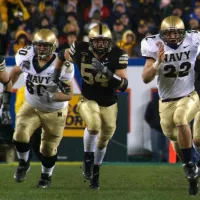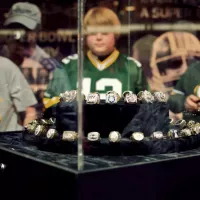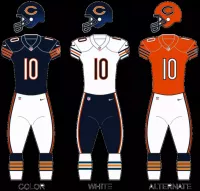A success timeline featuring the most significant achievements of Barry Sanders.
Barry Sanders was a professional football running back renowned for his exceptional agility and elusiveness. He played ten seasons in the NFL for the Detroit Lions, leading the league in rushing yards four times. Prior to his NFL career, Sanders had a record-breaking season at Oklahoma State in 1988, rushing for 2,628 yards and 37 touchdowns. He was awarded the Heisman Trophy and unanimously recognized as an All-American. Sanders is considered one of the greatest running backs in NFL history.
1940: Last Lions Rushing Leader
In 1990, Barry Sanders was the first Lions running back to lead the league in rushing yards since Byron White in 1940.
1958: Lions' Previous Postseason Win
The Detroit Lions hadn't had a postseason win since 1958, when they finally won in 1991 with the help of Barry Sanders.
1987: All-American as Return Specialist
In 1987, Barry Sanders led the nation in yards per kickoff return and was named a second-team College Football All-American as a return specialist.
1988: Record-Breaking College Season
In 1988, Barry Sanders had a record-breaking season in college football, setting college football season records with 2,628 yards rushing, 3,250 total all-purpose yards, 234 points, 37 rushing touchdowns, and 39 total touchdowns.
1988: Heisman Trophy-Winning Season
In 1988, Barry Sanders had his Heisman trophy-winning season, setting single-season college football records for most rushing yards gained, touchdowns scored, and total scrimmage yards, making it one of the greatest individual college football seasons ever.
1989: One of Best Rookie Seasons
Barry Sanders' 1989 season is regarded as one of the best all-time by a rookie running back.
1989: Rookie Season with the Lions
In 1989, during his rookie season, Barry Sanders started 13 games for the Lions. He finished the season with 1,470 rushing yards and 14 touchdowns, earning the NFL Offensive Rookie of the Year Award and a Pro Bowl selection.
November 24, 1991: Dominated against the Vikings
On November 24, 1991, Barry Sanders dominated against the Minnesota Vikings, rushing for 220 yards on 23 attempts and scoring four touchdowns. The Lions won the game 34-14, and Sanders dedicated the win to his teammate Mike Utley who suffered a career-ending spinal cord injury the previous game.
1991: First Postseason Win Since 1958
In 1991, Barry Sanders helped lead the Detroit Lions to their first postseason win since 1958, marking a significant achievement for the team.
September 25, 1994: Memorable Run Against Patriots
On September 25, 1994, Barry Sanders had 18 attempts for 131 yards and two touchdowns against the New England Patriots. He had a memorable 39-yard touchdown run where he juked and spun past Patriots safety Harlon Barnett.
1994: Led NFL in Rushing Touchdowns
In 1994, Barry Sanders led the NFL in rushing touchdowns, showcasing his ability to score and make a significant impact on the game.
1994: NFL Offensive Player of the Year
In 1994, Barry Sanders was awarded the NFL Offensive Player of the Year Award, recognizing his outstanding performance that season.
1995: 1995 Season achievements
In the 1995 NFL season, Barry Sanders recorded 314 attempts for 1,500 yards and 11 touchdowns. He was selected to the Pro Bowl and named an AP first-team All-Pro. The Lions made the postseason as a wild card, losing to the Philadelphia Eagles in the Wild Card Round 58-37, in what was then the highest-scoring postseason game in NFL history.
1996: 1996 Season Achievements
In the 1996 NFL season, Barry Sanders led the league in rushing yards with 1,553 yards from 307 attempts and 11 rushing touchdowns. He made the Pro Bowl and was named an AP second-team All-Pro. By the end of the 1996 season, he had 11,725 career rushing yards, ranking seventh all-time, and 84 career rushing touchdowns, ranking eighth all-time.
December 21, 1997: Reached 2,000 Rushing Yards
On December 21, 1997, in the season finale against the New York Jets, Barry Sanders reached 2,000 rushing yards for the season on a two-yard run. He finished the game with 23 attempts for 184 yards and a touchdown, helping the Lions win 13-10 and clinch a playoff berth.
1997: Co-won NFL Most Valuable Player Award
In 1997, Barry Sanders co-won the NFL Most Valuable Player Award with Brett Favre after rushing for 2,053 yards in 16 games, making him the third running back to surpass 2,000 yards.
1997: MVP and 2,000-Yard Season
In 1997, Barry Sanders rushed for 2,053 yards and was co-awarded the NFL Most Valuable Player Award with Brett Favre. He also received his second NFL Offensive Player of the Year Award.
1997: Named NFL Offensive Player of the Year
In 1997, Barry Sanders was named NFL Offensive Player of the Year for the second time, reaffirming his exceptional talent and impact on the game.
1998: Kansas Sports Hall of Fame Induction
In 1998, Barry Sanders was inducted into the Kansas Sports Hall of Fame, recognizing his achievements in sports.
1999: Ranked 76th Greatest North American Athlete
In 1999, an ESPN survey ranked Barry Sanders as the 76th greatest North American athlete of the 20th century, recognizing his broad impact and athletic prowess.
2000: NFL 1990s All-Decade Team
In 2000, Barry Sanders was included in the NFL 1990s All-Decade Team, recognizing him as one of the best players of that decade.
2003: College and Michigan Sports Hall of Fame Induction
In 2003, Barry Sanders was inducted into the College Football Hall of Fame and the Michigan Sports Hall of Fame, honoring his college and professional career.
August 8, 2004: Inducted into Pro Football Hall of Fame
On August 8, 2004, Barry Sanders was inducted into the Pro Football Hall of Fame, becoming the second-youngest player to receive this honor at the age of 36.
November 25, 2004: Number Retired by the Lions
On November 25, 2004, Barry Sanders' number 20 was retired by the Lions.
November 25, 2004: Jersey Retirement
On November 25, 2004, the Detroit Lions retired Barry Sanders' No. 20 jersey, honoring his contributions to the team.
August 21, 2005: Enshrined in Oklahoma Sports Hall of Fame
On August 21, 2005, Barry Sanders was enshrined in the Oklahoma Sports Hall of Fame, further cementing his legacy as a sports icon.
2007: Most Elusive Runner in NFL History
In 2007, Barry Sanders was ranked as the most elusive runner in NFL history by NFL Networks' NFL Top 10 series. He was also ranked as the greatest player never to play in a Super Bowl.
2011: Points and Total Touchdowns Record Broken
In 2011, Montee Ball broke Barry Sanders' record of 234 points and 39 total touchdowns set in 1988.
2012: Named Greatest Player to Never Play in a Super Bowl
In 2012, Barry Sanders was placed No. 1 on NFL Network's list of the greatest players to never play in a Super Bowl.
April 2013: Won Madden NFL 25 Cover Vote
In April 2013, Barry Sanders won the vote to be on the cover of EA Sports' Madden NFL 25, becoming the first player to appear on the cover of Madden NFL Football more than once. He previously appeared in the background of the Madden NFL 2000 cover.
2015: All-Purpose Yards Record Broken
In 2015, Christian McCaffrey broke Barry Sanders' record of 3,250 total all-purpose yards set in 1988.
2019: NFL 100th Anniversary All-Time Team
In 2019, Barry Sanders was named to the National Football League 100th Anniversary All-Time Team, celebrating his legacy as one of the greatest players in NFL history.
January 13, 2020: Honored at College Football Playoff National Championship
On January 13, 2020, Barry Sanders was honored as the No. 9 player of all time during halftime at the College Football Playoff National Championship game, commemorating the 150th year of college football.
September 2023: Bronze Statue Dedicated at Ford Field
In September 2023, the Detroit Lions dedicated a bronze statue of Barry Sanders outside Ford Field, celebrating his contributions to the team and his legacy in the sport.
Mentioned in this timeline

Basketball is a team sport played on a rectangular court...

Amazon Prime is a subscription service offering a variety of...

Brett Favre is a retired NFL quarterback renowned for his...

College football is a popular amateur sport in the United...

The Super Bowl is the annual championship game of the...

The Chicago Bears are a professional American football team based...
Trending

22 minutes ago Cameron Boozer: Duke Forward, Elite Numbers, and Wooden Award Favorite

22 minutes ago Josiah Harrell's Sensational UFC Debut After Rare Brain Disease Diagnosis: A Houston Story

23 minutes ago Rajah Caruth shines at JR Motorsports; Mayer takes pole; Mears avoids crash.

23 minutes ago Anthony Black scores 20 points in Magic's Thursday's victory, Desmond Bane contributes.

23 minutes ago Yaxel Lendeborg's life story, Michigan rise, and draft prospects are revealed.
1 hour ago Alabama Basketball Faces LSU: A Crucial Road Matchup and Maturity Test Looms
Popular

Jesse Jackson is an American civil rights activist politician and...

Barack Obama the th U S President - was the...

Ken Paxton is an American politician and lawyer serving as...

Bernie Sanders is a prominent American politician currently serving as...
Randall Adam Fine is an American politician a Republican who...

Michael Joseph Jackson the King of Pop was a highly...
